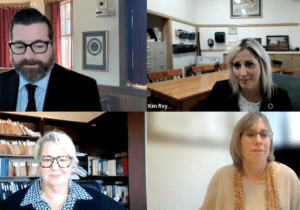Who is a member?
Our members are the local governments of Massachusetts and their elected and appointed leadership.

An MMA webinar reviewed best practices for running an effective meeting from start to finish. Speakers included (clockwise from top left) Winchester Select Board Member Michael Bettencourt, Norwell Assistant Town Administrator Kim Roy, Cohasset Advisory Committee Member Diane Kennedy and Attorney Karis North of Murphy, Hesse, Toomey & Lehane.
An MMA webinar today reviewed best practices for running an effective meeting from start to finish.
Norwell Assistant Town Administrator Kim Roy moderated the panel discussion, which covered agenda preparation, chair responsibilities, public participation, holding meetings in person as well as virtually, and drafting meeting minutes.
Panelist Mike Bettencourt, a Select Board member in Winchester, recommended establishing norms and goals that align with the common interest of a board or committee. Working within set guidelines will help define leadership roles and create a less combative and better managed environment, he said.
Regarding agenda preparation, Diane Kennedy, an Advisory Committee member and former Select Board member from Cohasset, stressed the importance of the “big picture.” Understanding how a meeting will progress creates more balance, structure and efficiency, she said.
“The placement of public comment in an agenda can also change things,” she said, “which is why the norms Mike mentioned are so important.”
Attorney Karis North of Murphy, Hesse, Toomey & Lehane discussed the responsibilities of a chair during meetings. As the presiding officer, the chair must remain impartial while enforcing the rules of the board, keeping the discussion focused on the pending motion, recognizing speakers during public comment, and putting motions to a vote.
Above all, the panelists agreed, the chair must strive to create a comfortable environment so that the meeting fosters trust and welcomes discourse.
Panelists said public comment periods work best at the end of meetings, with a time limit. Kennedy said it’s important to allow the public to comment, as long as the process is well-managed. North explained how public comment periods have evolved since the Supreme Judicial Court ruling in the Barron v. Southborough case.
Bettencourt explained how the public sector was thrust into hybrid meetings following the pandemic, adding that the format is convenient and enhances public participation. Managing agendas for remote meetings, however, is even more important, he said, given that chairs and other leaders have less control than they would in a physical meeting space.
The panel concluded by reviewing best practices and requirements for meeting minutes. Due to public demand, Kennedy and Bettencourt said their communities have hired staff to document and distribute minutes, eliminating bias and increasing efficiency.
North emphasized that minutes should be a written summary of the meeting; video and audio recordings are not a supplement. The date, time and location of the meeting are required, as well as the list of members present and any votes/motions approved, among other details.
Roy moderated 15 minutes of questions and answers, which addressed inquiries about generating public interest in town meetings, making agendas manageable, and managing unruly public participation.